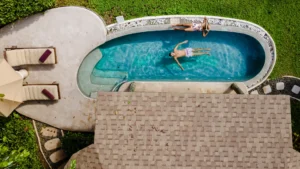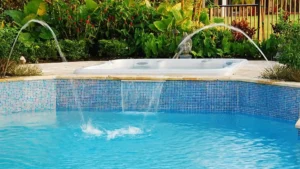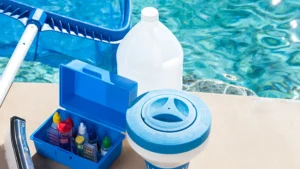
With hurricane season and tropical storms in Florida approaching, ensure your swimming pool and deck areas are properly prepared to minimize damage and ensure a swift recovery from flash flooding. As your local pool company, we have put together essential tips for pool hurricane preparedness to help you protect your pool before, during, and after a storm.
1 Week Before Possible Tropical Storm:
- Swimming Pool and Deck Areas: Secure Loose Items: Remove or secure all loose items on the pool deck, including safety equipment, to prevent them from becoming dangerous projectiles.
- Trim Surrounding Vegetation: Trim trees and shrubs around the pool area to reduce the risk of falling branches and debris.
- Inspect Pool Fencing: Check your pool fencing for any damages or weaknesses and repair as needed.
- Increase Chlorine Levels: Boost chlorine levels in your pool to maintain sanitation.
- Inspect and Secure Pool Covers: Ensure pool covers are in good condition and securely fastened to prevent them from becoming flying objects.
- Backup Power Preparation: Verify backup power sources for essential pool equipment, including pumps and filtration systems. Test backup generators or alternative power supplies to ensure operational.
- Arrange refueling or maintenance of backup power sources, consider potential supply chain disruptions during severe weather.
For commercial properties, coordinate with property management to reinforce covers if necessary and contact an specialized team like Amenity Pool Services.
2-3 Days Prior to Imminent Hurricane or tropical storm:

- Shock the Pool: Apply extra shock treatment to the pool and circulate the water.
- Pool Water Levels: Drain the water in the pool down to a few inches, but mostly, do not drain it. Make sure auto-fills are shut off.
As stated by the Florida Swimming Pool Association, the weight of the water helps keep the pool anchored, thus avoiding high-water table pressure that will pop the pool out.
- Turn Off Electricity: The first thing to do in this situation is to turn off all electricity supplying the pool equipment, including electric motors, chemical feeders, and heaters. The breaker corresponding to each equipment in the electrical panel can now be used. However, the sump pumps should be kept on to pump out any accumulating water, which could be another nuisance.
- Lock and Secure Lids: Once the electrical works have been tended to, all lids on the pool equipment should be checked to ensure that every lid is locked and securely closed. This is to ensure that no unauthorized access occurs and that the lid should protect the equipment from any damage due to Mother Nature or wildlife.
- Remove or Secure Deck Furniture: Another important step is to remove or secure any furniture or other items on the deck.
Pro Tip: Check the Miami weather through an official channel or a hurricane tracker
How to clean my pool after a storm?

- Debris Removal: Start the process of debris removal. Depending on the volume of debris, the pool may need to be drained and cleaned with a light acid wash. Large debris like tree branches and sand might require professional assistance for removal.
- Equipment Check and Chemical Adjustments: Check all pool equipment for damage. Clean and dry thoroughly before turning the power back on. Turn on the autofill when debris is cleared. Test water chemistry, shock the pool as necessary.
- Pump Systems: Start pump systems once heavy debris is cleared from pool. If pumps are non-operational, manually feed chemicals until the system is back online. Reach out to your local pool maintenance company for assistance.
- Filter Cleaning: Clean filters more frequently until the pool is free of debris and water chemistry is balanced.
Pro Tip: Hire a hurricane pool repair service expert to analyze the real damage.
As per American Pools & Spa, ensuring the safety of your family and pets should be your top concern. If your pool seems to have been damaged by the storm, it’s advisable to contact a swimming pool expert to evaluate the pool’s safety and condition before using it.
FAQ's about Preparing Your Pool for a Hurricane
1. When is it hurricane season in Florida?
Although hurricanes can happen outside this time frame, the hurricane season in Florida officially ends on November 30. Continue to keep your pool ready at all times throughout the season, and always watch for updates to the weather, especially during the storm-crowded period of mid-August and late-October.
2. May I throw patio furniture into the pool during a storm?
Not at all. Throwing furniture or any other things into the pool can damage the pool surface, and equipment will be created. These should better be stored in closed-up indoors or anchored heavily if movable items can work, so they are not flying around and also have a clean and non-damaged pool.
3. What is the best approach to save or clean the pool after a hurricane or tropical storm in Florida?
After the hurricane, we recommend you to hire a local Miami pool service specializing in hurricane pool repair, so they can start to clean out debris such as leaves, branches and sand from the pool. Then, check the damaged pool equipment before putting the systems in operation. Test and balance water chemistry. Regularly clean filters until the clarity of water returns.
4. Can floods from a Texas storm affect my pool?
Yes. In the event of a Texas flood, pool contamination from mud, oil, or sewage is a serious risk. If your pool is flooded: Do not use the pool until water is properly treated. Remove debris and drain partially if necessary. Use shock treatment and consult a local pool expert to restore water chemistry and functionality.
5. When can I start using my pool again after a hurricane?
You can reopen your pool only once: All debris is cleared. Water chemistry is balanced. All equipment has been checked and is operational. Based on the magnitude of the storm, it could take anywhere between a few days to a couple of weeks. To be sure, prioritize safety and consult with experts.






